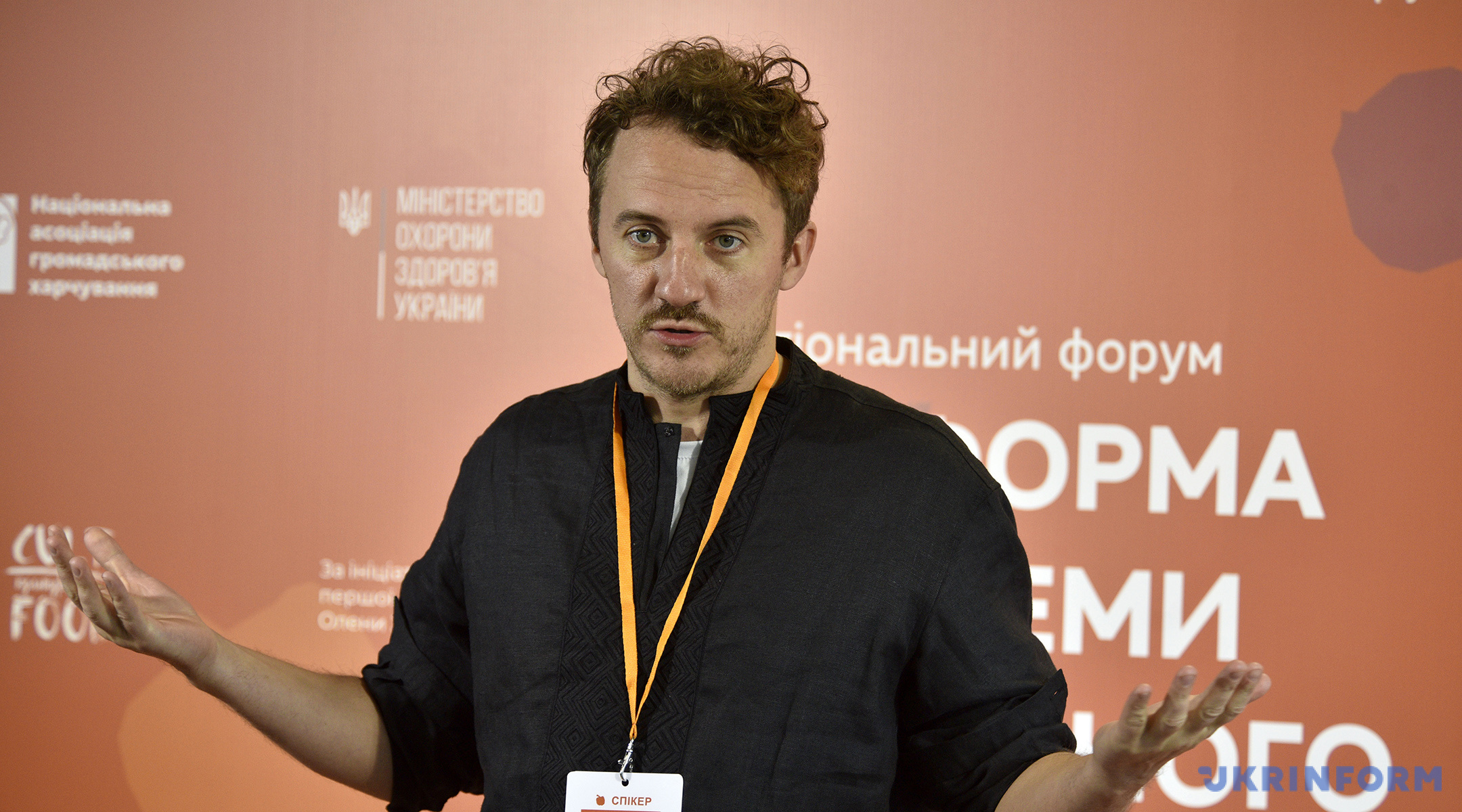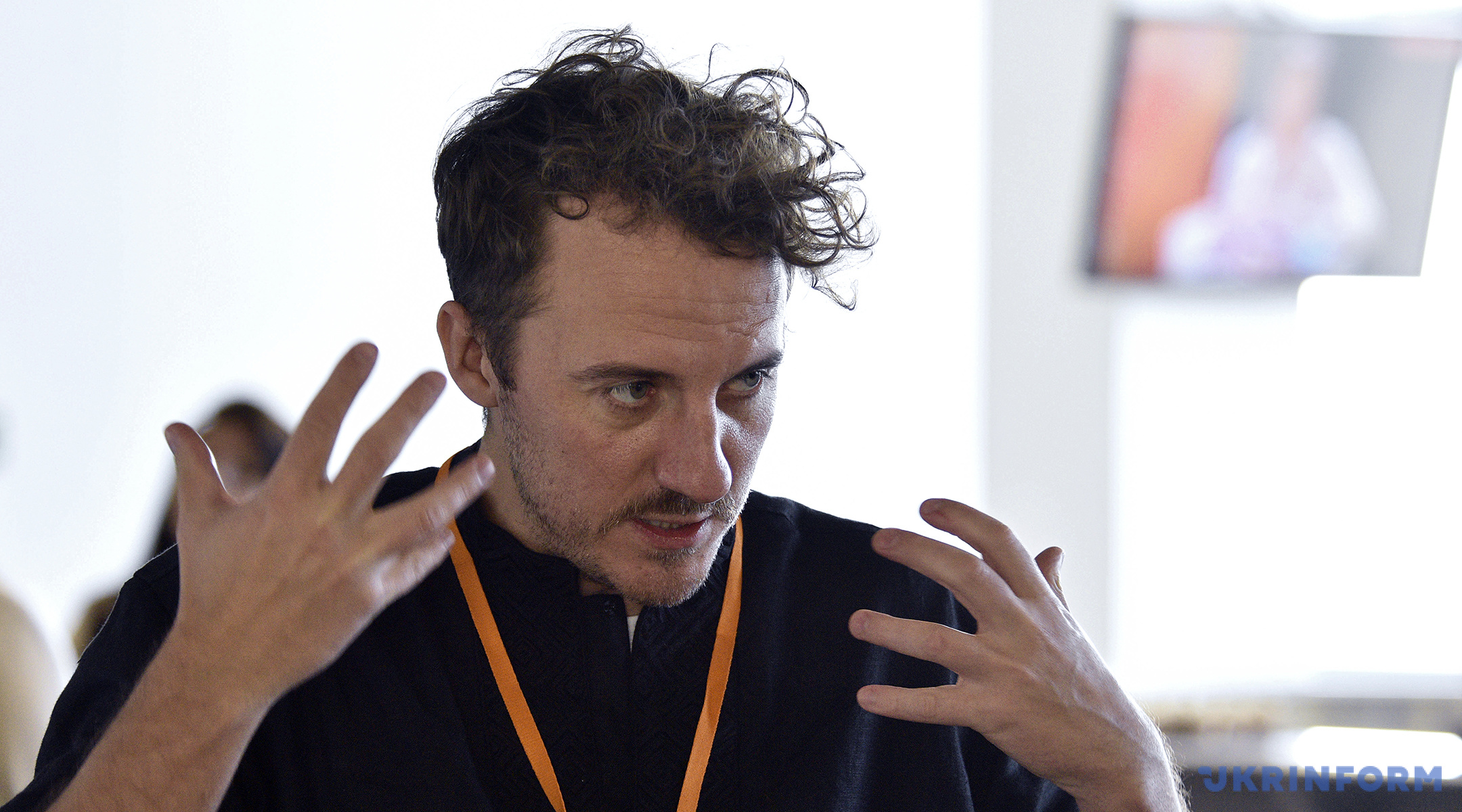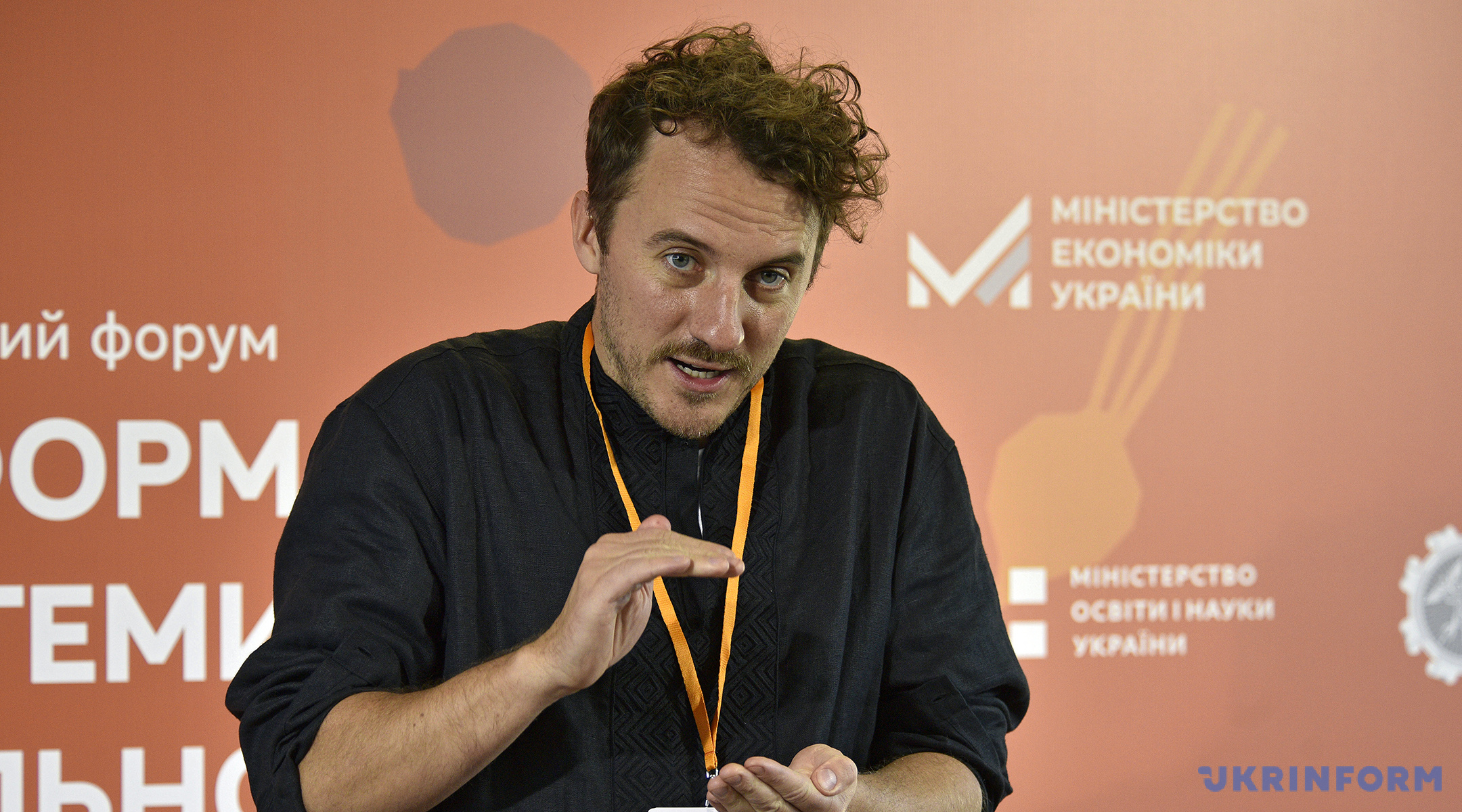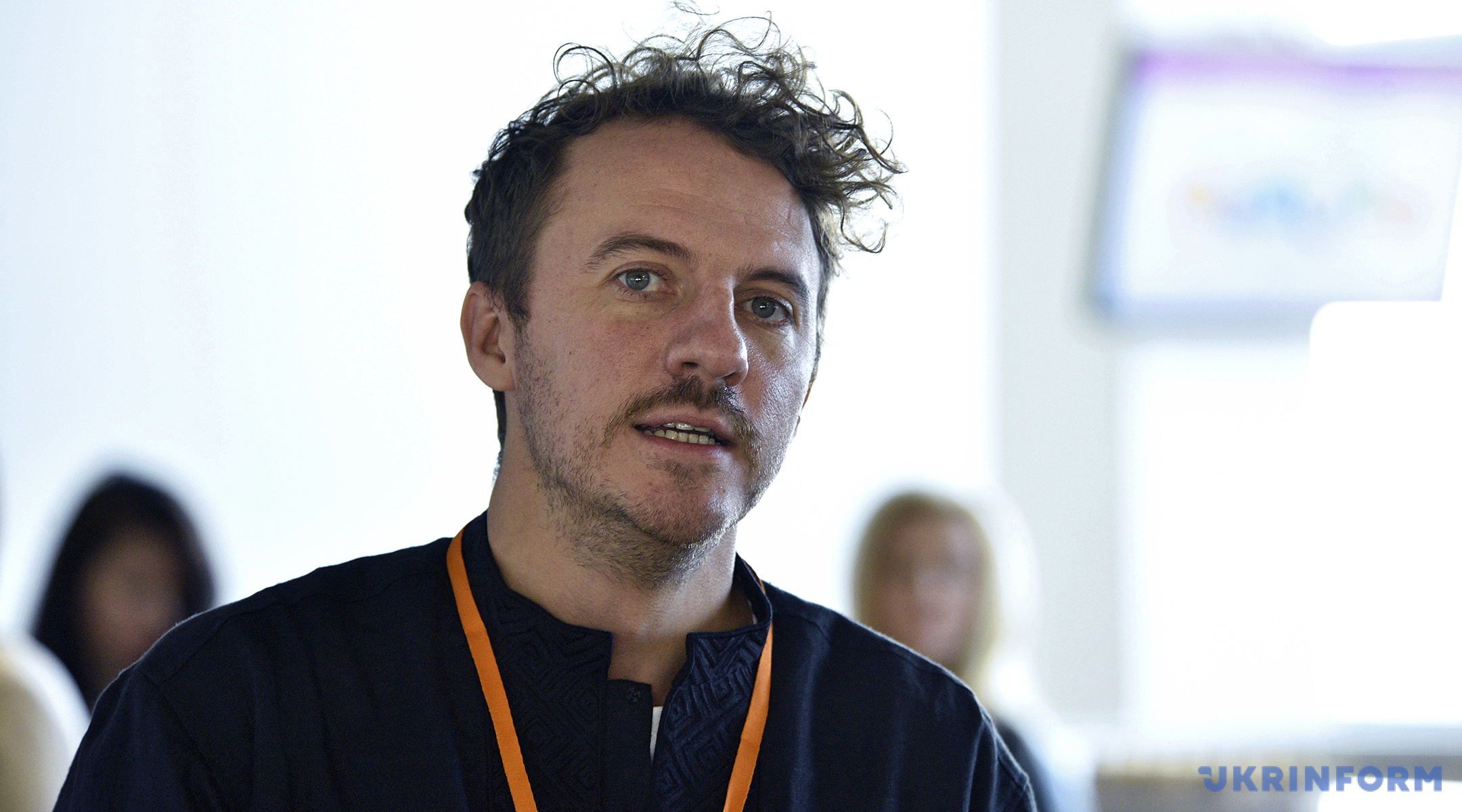We meet with Ievgen Klopotenko, chef and founder of the New School Nutrition social project aimed to shift school menus toward the “Cult Food” nutrition culture, at a regional forum in Lviv, entitled "Reform of the School Nutrition System."
From January 1, schools will be introducing a new menu he personally developed, sacking the currently enforced regulations dating back to 1956). At the same time, several thousand Ukrainian schools have already been following Klopotenko's nutrition advice since the start of this academic year, and the reform has seen received lots of positive reviews. Children enjoy baked nuggets much more than fried cutlets, also opting for warm fresh minestrone instead of cold brine. The menu, on which Klopotenko worked for more than 4 years, accounts to some 160 delicious and healthy dishes. But the most important thing, the chef says, is to mold a better public attitude to food and its consumption, which has been mostly neglected for decades. The chef seeks to engrave in children’s minds the code of "Ukrainian healthy food."
Ukrinform asked the popular food expert why it is important to eat healthy, whether it is possible to impose on the entire generations a habit of cooking healthy, and how conditional oregano beets may help change the mentality of Ukrainians.

LEMISHKA OR MOLECULAR CUISINE?
- Ievgen, you have become the only Ukrainian to be included in the 50 Next ranking, which praises professionals who are changing the world of gastronomy. What does this recognition mean for you and Ukraine in general?
- When I received a message that I was put in that s list, I just dropped the phone and started crying out loud. See, for me, this is the meaning of my life. I want to make Ukraine a cool place rather than live in a country where everything is sad.
There are only three people from Europe on that list. The jury sifted through 50,000 applications to choose the best ones in gastronomy. They looked at my work and said, yes, it really has an impact. And their decision is completely unbiased. After that, the door to the world opened wide for me, so I can travel to various culinary forums, meet other professionals, and boast of being on the 50 Next list, a real world-class expert. For me, it was as if the wall had collapsed. As if Ukraine hadn’t been on the gastronomic world map, but I then I came and cut out a hole with a knife, jumped in there and now I’m going to call everyone else to join me.
- Has this become possible thanks to your active worldwide promotion of Ukrainian borscht?
- Yes, I believe a lot depends on borscht. I crafted a promo campaign, which, strange as it may sound, no one in the world had done before. Extensive and huge, it’s aimed at protecting our gastronomic identity. It’s thanks to this campaign that I won, so I don’t hide it.
And in our country, borscht is a cult – a staggering 98% of Ukrainians eat it. It’s what unites us, regardless of social status, political beliefs, or religious affiliation. So, I did what preachers do – I started praising borscht across the world. Now everyone knows about our borsch. And they love it, too…
- Even children do, who are not always too happy to eat soup. Is there borscht in our new school menu too?!
- It definitely is. And I rejoice over this because it's part of our identity. Things have mostly been said with soup in school cafeterias. Often, children are offered cooled meals that are supposed to be consumed hot. And those meals look awful, too. But if it's red borscht, it must be really bright in that bowl, looking delicious.
But it’s not only Ukrainian dishes that are on the new menu – it’s recipes from across the world. This is for our students to expand their knowledge in geography not only in terms of reading maps, but also in their general perception. This is for them to learn to enjoy food with no trans fats and insane amounts of salt. And most importantly, this is for them to develop healthy eating habits. For example, minestrone allows you to have a sneak peek into Italian culture, lobio is a Georgian national dish, and we’ll also have a Mexican burrito with salsa… I try to convert Ukrainians from Soviet to global gastronomic culture.

- But there are many national Ukrainian dishes, too, including banosh, shpundra, vertuta, tovchanka, Lviv cheesecake, kulish, and shulika… However, these dishes are no longer made like they were 100 years ago, as you add some "experimental" twist to them. That is, do you combine ancient traditions with modern ones…
You take that lemishka, you modernize it, and there you have some cool healthy chips, a recipe that I will pass on to future generations
- The best world practices say that without embracing your past, you’ll have no future. As the Lemkos people say, you can't grow your tree without your roots. That is why I study, revive, preserve, and pass recipes on to the next generations, as Olha Franko or Daria Tsvek did. Earlier, people used to make a lemishka (a thick buckwheat gruel). Now people no longer fancy dough too much. But you take that lemishka, you modernize it, and there you have some cool healthy chips, a recipe that I will pass on to future generations. In 50 to 70 years, there’ll be molecular food. Someone will take that molecular lemishka, try it out, and pass it on. That is why history and modernity always go together in gastronomy.
- But our children are not used to, say, cinnabon, beef stroganoff, lobio, frittata, or healthy chips. Often, they don't even know what that is.
- It’s only adults who prefer food they’ve grown used too, not children. Kids eat what you give them. And over time, they’ll want to try something new. Adults might say, “I’ve been eating bubliks (bagels) for 40 years already, so why would I want your healthy chips?” But kids would think, ‘This is dope stuff, I saw it on YouTube, that one blogger tried it… And that’s it. In fact, this is exactly how shifts occur.
- Promotion through social networks and digitalization?
- Of course. All kids already have access to Instagram. If they follow global trends, express interest, see that certain food is attractive, and read that it’s useful, vibrant, and modern, they’ll eat it. This is how this model works. Even in rulral areas, kids won’t eat burnt pancakes or cracklings because that’s what their granny eats them. No! They’ll only eat this if they have no alternative. But we offer them healthy food in attractive packaging.
As for digital, I’d like to see a centralized system. We are already working to have not only developed recipes, norms, and tips, but also data on purchases, tenders, and prices… So that everyone can click on any school’s tab and see what food they have there now. This is a modern approach.

UKRAINIANS WILL ONCE LOVE SHPUNDRA AND MASALA TEA
- From January 1, food standards will change in all schools across country. Are they ready for this transition financially, technically, and ideologically?
- Everything is happening gradually. And although the smooth transition period should last up until August 1, 2022, I think we’ll see the result somewhere in three years. It all started back in 2018, when I created and officially approved at the official level a recipe collection with 110 new dishes for school cafeterias. Now more than 4,000 schools have switched to new menus, and their number is growing every month. There were cases where school principals didn’t get the idea, why they’d need anything like this, while school chefs sabotaged the new shifts as they simply didn’t know how to cook that food. But we travel the regions, telling and showing people how it’s done. Of course, I won’t be physically able to visit 15,000 schools across Ukraine, but there’s modern technology to this end. I have made an online video course on cooking covering the school menu and anyone is able to watch it – it's not as scary as it seems at first glance.
- This is how parents can learn. After all, most Ukrainians don’t cook much of the stuff their kids eat at school.
- They can if they want. But practice shows it’s impossible to teach parents. They are firm in their beliefs and often skeptical. In their opinion, parents have many more important concerns than learning to cook better food: making money, taking care of their homes, ensuring their kids’ safety, and other vital issues.
That's why we focus on children. We should plant our seeds in them while their minds are open. And then these seeds will germinate – and these kids will be automatically aware of a healthy diet.
So that’s one trick. And there is another: a kid comes up to their mom and says: "Mom, make me a shpundra (a traditional Ukrainian pork and beets dish - ed.), I ate it at school today!" Mother says, "What are you, crazy?" But then she might eventually make it. That's how it might work.
- What do children like the most?
- Children, to be honest, are difficult in this regard... We ran a survey and saw that 90% of our children want to have salad bars in schools, so they can choose a salad and drink fresh fruit. But I won’t be able to deliver on this yet. They mostly eat what looks good, nuggets, for example. Here we bake them in the oven instead of deep-frying. They are tastier and healthier this way. So this is what they like.
And they also opt for something unique: say, a beet salad with seeds and oregano, because it just sounds kind of cool. Masala tea first attracts them with its magical name, and then they reveal the taste of spices. And it has almost no sugar, it’s so fresh and nice…
I often hear, "My child doesn't eat veggies." But they normally eat vegetables if they are well cooked and nicely served. Vinaigrette sauce is just a win. Add it to any dish and it makes it much more delicious.
Another win is that we have introduced spices into the school menu. Thanks to this, school cafeterias finally have this nice smell of tasty food, rather than that of burnt oil or cutlets. So children now actually want to go to those cafeterias.

AFTER SCHOOLS AND KINDERGARTENS, THERE’LL BE NEW MENUS IN HOSPITALS AND PRISONS
- Are you currently working on a menu for preschoolers?
The idea is this: children eat healthy food in kindergarten, at school, and then they’ll start cook healthy, themselves – for their children, and then for their grandchildren
- What are you working on at the moment and what are your plans for the future?
- I also plan to change the menu in hospitals, prisons and pre-trial detention centers, as well as in the army. Although there has already been a reform in the Armed Forces, everything is fine there (well, maybe not all, but things are at a normal level). If we launch this school reform successfully, nothing else would be a problem. I’ve got everything I need – resources and people – so it just takes time.
- And why do you, a successful chef, care so much about it?
I don’t want people in our country to continue to preach salads drenched in mayo – it's time to change these stereotypes
- I don’t want to live in a country where people love mayonnaise. I don't want to live next to people who think our past is better than our future. I want to live in a society where people share common values. They might all be different, of different upbringing, religion, or political views, but if someone loves borscht, it’s a value worth fighting for. I want to hear Ukrainians discuss things like: - No, I will not eat asparagus today, I had it just yesterday. - And what about shpundra? - Yes, I’ll make it for the New Year’s.”
If I have to do some renovations in my apartment, I start with the kitchen!
This is a different mentality. And I can't change their firmware completely. But I can do it in terms of food choices. If I do it with food, someone else will reset people’s attitude to healthcare, someone – to education, and someone – to their societal behavior. So this is the way we will mold a Ukrainian with whom I would like to live side by side. So I started off with children. And I believe that in some 20 years, they will become the ones I will talk to on an equal footing about shpundra or chakhokhbili. If I have to do some renovations in my apartment, I start with the kitchen!
Liudmyla Hryniuk, Lviv
Photo: Markiyan Lyseiko
im
